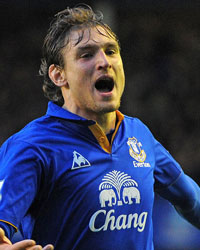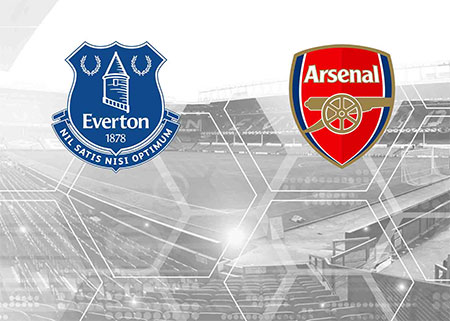EVERTON PAST PLAYER PROFILE
Nikica Jelavić

| Squad number | 7 |
| Position | Striker |
| Joined on | 31 January 2012 |
| Joined from | Glasgow Rangers |
| Transfer fee | £5.5m |
| Signed by | David Moyes |
| Debut as sub | v Wigan Athletic (A) 4 February 2012 |
| Full debut | v Tottenham (H) 10 March 2012 |
| Contract duration | 4½ years |
| Contract expires | June 2017 |
| Finalé | v
QPR (H) 4 January 2014 |
| Left Everton | 14 January 2014 |
| Destination | Hull City |
| Transfer Fee | £7.5m |
| Born | Čapljina, Croatia |
| Date of birth | 27 August 1985 |
| Height | 6 ft 2 in (1.87 m) |
| STRENGTHS |
| First-time finishing |
| Movement and workrate |
| Ball retention |
| WEAKNESSES |
| Out-and-out speed |
| Distribution |
With another confusingly poor first half to a Premier League campaign threatening a lost season at best and a relegation dogfight at worst, David Moyes was, by January 2012, in dire need of a proven goalscorer.
Ageing Talisman Tim Cahill was struggling through the worst goal drought of his career and despite enjoying his most injury-free run in the Blues' first team Louis Saha had seen his goals dry up almost entirely as well.
Though they sat 9th in the table going into 2012, Everton had lost two more games than they'd won and only Wigan Athletic had scored fewer goals in the top flight.
With finances tighter than ever under his tenure, Moyes freed up funds in the January transfer window with the sale of Diniyar Bilyaletdinov and, after bringing in Darron Gibson from Manchester United for an initial outlay of just £250,000, he cast his eye to his homeland and Glasgow Rangers for a striker.
Born in the old Yugoslavia and a product of Croatian side Hajduk Split's youth system, Nikica Jelavić had only been at Ibrox for 18 months, having signed from Rapid Vienna for £4m in August 2010, but his impact in the Scottish Premier League was almost immediate.
In 56 appearances in all competitions he racked up 36 goals and had started to attract interest from England, with some reports suggesting that then Liverpool boss Kenny Dalglish had turned down the chance to sign him in August 2011.
With the sudden revelation that the Scottish giants were on their knees financially, Moyes stepped in at the end of January 2012 with a £5.5m offer for the Croatian striker that Rangers could hardly refuse. Perhaps a sign of the magic he would soon bring to the front line, Jelavić was paraded before the faithful on transfer deadline day at half-time of the home game against eventual champions, Manchester City, a game that the Blues would win 1-0.
Concerns that he would either struggle or take time to make the step up from the SPL to the Premier League were quickly dispelled once Jelavić was able to get his Everton career underway.
After making his debut as a substitute in a 1-1 draw at Wigan Athletic, a hip injury would keep him out of the team for the next two games but he returned as a sub at QPR in early March. Jelavić would mark his long-awaited home debut with a goal, though, scoring the winner against Tottenham with the kind of wonderfully controlled first-time finish that would become the hallmark of his introduction to English football.
Adding mobility, industry, movement and surprising aerial ability, Jelavić proved over the next three months that he was everything Everton had lacked, not only for almost all of Moyes's tenure but arguably going all the way back to the sale of Gary Lineker in 1986.
In 11 League starts, the 26 year-old scored 9 goals, 11 overall in 16 appearances in all competitions, including memorable FA Cup goals in the quarter-final replay at Sunderland and in doomed semi-final at Wembley against Liverpool.
In so doing, he became the fastest striker to reach double figures in Everton's history, reaching 10 goals in 910 minutes of playing time, and announced his himself as an instant Goodison hero.
In tandem with the form of returning favourite, Steven Pienaar, by the final 9 games of that season, Jelavić had helped transform a struggling team into a confident, free-scoring outfit that eventually finished seventh, ahead of rivals Liverpool.
Jelavić carried his goalscoring form into the European Championships in the summer of 2012, scoring with one of the few clear-cut chances that would come his way in a 3-1 victory over the Republic of Ireland in Group B. He was unable to help Croatia beyond the Round of 16, though, and his country was eliminated at the group phase.
When the Premier League resumed for the 2012-13 something appeared to seriously awry for Jelavić and the one-touch exponent of goal-plundering went through an increasingly barren patch. Five goals in his first 11 League games was a decent enough return, but just one more goal between early November and the end of the year – a last-gasp winner against Tottenham at Goodison, it was arguably his most dramatic, though – was evidence of something more concerning.
Goal droughts happen to all strikers and if it was initially a question of service, it would develop into an issue of confidence and by early 2013 Moyes was looking to Victor Anichebe to supply the team's goals and the Croatian was demoted to the substitutes' bench.
Another dramatic late strike against Manchester City in March offered hope of another renaissance for Jelavić but it would, instead, go down as his last Premier League goal for the Blues.
In the following season, having drawn three blanks in Roberto Martinez''s first five games he would lose his place to on-loan striker Romelu Lukaku who would make the starting berth up front his own with an impressive return of goals.
Jelavić's Everton swansong would come in the 3rd Round FA Cup tie against QPR in January 2014 where he scored two and really should have bagged a hat-trick but for some ironic overconfidence on executing a penalty, where he chipped the 'keeper but hit the bar.
Half-way through the January transfer window, he moved on to Hull City in a deal worth a healthy £7.5m. He left Everton with the distinction of being the fastest player to reach double figures for goals for the club in over 100 years, taking 910 minutes to reach that tally.
| Everton Career | |||||||
| Season |
Squad Number |
League Apps (sub) |
League Goals |
Cup Apps (sub) |
Cup Goals |
Total Apps (sub) |
Total Goals |
| 2011-12 | 7 | 10 (3) | 9 | 3 (0) | 2 | 13 (3) | 11 |
| 2012-13 | 7 | 26 (11) | 7 | 5 (1) | 1 | 31 (12) | 8 |
| 2013-14 | 7 | 5 (4) | 0 | 1 (0) | 2 | 6 (4) | 2 |
| Totals | 41 (18) | 16 | 9 (1) | 5 | 50 (19) | 21 | |
| Previous Career | |||
| Season | Team | League Appearances | Goals |
| 2010-2012 | Glasgow Rangers | 45 | 30 |
| 2008-2010 | Rapid Vienna | 71 | 27 |
| 2007-2008 | Zulte Waregem | 23 | 3 |
| 2002-2007 | Hajduk Split | 35 | 8 |








